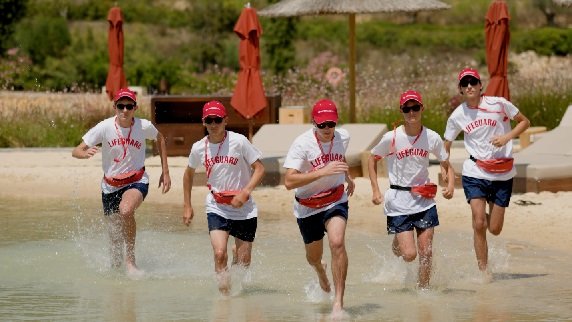Lifeguard training is the cornerstone of safety at aquatic facilities, equipping individuals with a specialized set of technical skills that are vital for the protection of swimmers. These skills are not only essential for lifeguards but also serve as a foundation for anyone considering a career in this pivotal profession.
In this article, we will delve into the critical technical skills that lifeguard training imparts, from water rescue techniques to life-saving first aid and CPR. Lifeguard classes, available in your vicinity, provide comprehensive instruction that can make a significant impact in handling emergency situations.
Mastering Water Rescue Techniques
Lifeguard training begins with the fundamental skill of water rescue techniques. Lifeguards undergo rigorous instruction on recognizing distressed swimmers and deploying rescue equipment like life buoys and tubes.
They also become adept in executing a variety of water entries, including shallow water entries and slide-ins, which are indispensable for successful water rescues. These techniques enable lifeguards to promptly and safely reach individuals in need of assistance.
Vigilant Surveillance
Lifeguards are the silent sentinels of aquatic safety. Their vigilant surveillance is a core skill that involves continuously scanning the water for potential risks or distressed swimmers. Proper positioning and effective scanning patterns are taught in lifeguard classes to ensure unwavering vigilance.
Lifeguards are also trained to use hand signals and whistles to communicate with each other and to alert swimmers to potential hazards or unsafe behavior.
First Aid Prowess
First aid is a linchpin of lifeguard course. Participants learn how to assess injuries and administer first aid in various scenarios, including cuts, burns, and sprains. They are trained to immobilize and stabilize injured individuals and to recognize signs of more severe conditions, such as spinal injuries.
CPR: A Life-Saving Skill
CPR, or Cardiopulmonary Resuscitation, is a vital skill that all lifeguards must master. Lifeguard certification programs include comprehensive CPR training, instructing participants on how to perform chest compressions and rescue breaths for both adults and children. CPR skills can be the difference between life and death in cases of cardiac arrest or respiratory distress.
AED Proficiency
In addition to CPR, lifeguards are also trained in the use of AEDs (Automated External Defibrillators). These devices can administer an electric shock to individuals facing sudden cardiac arrest, potentially restarting their heart’s normal rhythm. Lifeguards learn how to use AEDs safely and effectively and when to apply them in emergencies.
Expertise in Spinal Injury Management
Spinal injuries can be life-threatening if not managed correctly. Lifeguard programs include instruction on how to recognize and respond to potential spinal injuries. Lifeguards are trained to maintain the head and neck in a neutral position and safely immobilize injured individuals until professional medical assistance arrives. Proper spinal injury management can make the difference between full recovery and a lifetime of disability.
Water-Based Skills
Lifeguards must be proficient swimmers themselves. Training programs encompass rigorous swimming assessments to ensure lifeguards are confident and competent in the water. These skills include treading water for extended periods, efficient swimming strokes, and the ability to dive for submerged victims. Moreover, lifeguards are trained in safe water entries and exits to prevent personal injury during rescues.
Effective Communication and Crowd Control
Clear and effective communication is a cornerstone of lifeguarding. Lifeguard classes emphasize the importance of concise communication with colleagues and the public. Additionally, lifeguards are trained in crowd control techniques to manage busy swimming areas, ensuring that everyone can enjoy the water safely.
Mastering Emergency Action Plans
Lifeguards need to be well-prepared for any emergency situation. They learn how to develop and execute emergency action plans that cover a wide range of scenarios, from minor injuries to mass water rescues. A well-structured plan ensures that lifeguards can respond quickly and efficiently even in high-stress situations.
Teamwork and Leadership
Lifeguards often function as part of a cohesive team, and effective teamwork is essential for a coordinated response to emergencies. Lifeguard courses instill the importance of teamwork, including clear roles and responsibilities, effective communication, and supporting fellow lifeguards during challenging situations.
Furthermore, lifeguards are trained to take on leadership roles when required, providing direction and making critical decisions to ensure the safety of swimmers.
Acquiring In-Depth Knowledge of Aquatic Environments
Understanding the aquatic environment is paramount for lifeguards. They receive instruction in assessing water conditions, such as currents, tides, and wave patterns. This knowledge empowers lifeguards to anticipate potential risks and adjust their surveillance and rescue efforts accordingly. A deep understanding of the specific aquatic environment they oversee is essential for effective lifeguarding.
Legal and Ethical Responsibilities
Lifeguard training also encompasses education on the legal and ethical responsibilities that come with the profession. Lifeguards learn about their duty of care to those under their supervision and the potential legal consequences of negligence. This understanding helps lifeguards make sound decisions and take appropriate actions during emergencies.
In conclusion, lifeguard training is a comprehensive process that imparts a wide array of technical skills vital for ensuring the safety of swimmers in diverse aquatic environments. These encompass water rescue techniques, vigilant surveillance, first aid, CPR, AED usage, spinal injury management, water-based skills, effective communication, and crowd control, emergency action plans, teamwork and leadership, knowledge of aquatic environments, and comprehension of legal and ethical responsibilities.
If you aspire to embark on a career as a lifeguard, you can explore lifeguard classes available near you. The American Lifeguard Association is a reputable organization offering lifeguard certification programs, providing participants with the necessary technical skills and knowledge required to become proficient lifeguards.
Lifeguarding is a pivotal profession, playing a crucial role in ensuring swimmer safety, and the skills learned during lifeguard training can be the defining factor in emergency situations.
